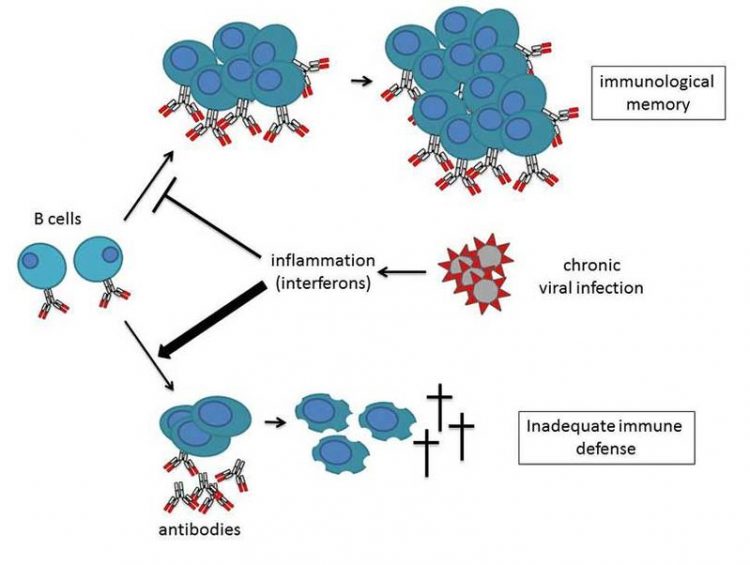Inflammation Triggers Unsustainable Immune Response to Chronic Viral Infection

Under the influence of interferons, chronic viral infections cause strong inflammation. This causes the B cells to initiate an inadequate immune response. Department of Biomedicine, University of Basel
In the course of an infection or upon vaccination, specialized cells of our immune system, so-called B cells, produce antibodies that bind viruses and inactivate them. In the context of chronic viral infections such as HIV or hepatitis C virus, however, antibody production by B cells is quantitatively inadequate and starts too late.
A team of scientists headed by Prof. Daniel Pinschewer at the Department of Biomedicine, University of Basel, reports that the inadequate antibody response to chronic viral diseases is due to the strong inflammatory reaction upon infection. While most pronounced at the onset of an infection, inflammation can persist for decades, especially in HIV/AIDS.
Hasty immune response lasts only short-term
Under the influence of inflammatory messengers, so called interferons, B cells produce as many antibodies as they possibly can. Unfortunately, this hasty response occurs at the expense of sustainability. B cells that turn on antibody production too quickly lose their potential to proliferate and die shortly thereafter. As a consequence, the immune response takes an impetuous start but subsides rapidly.
The scientists assume that this panic reaction of B cells reflects a mechanism ensuring an optimized response to acute life threatening infections. In the context of chronic infections, however, the battle is not decided within a matter of days, but rather only after months or years. Under these circumstances, the hasty reaction of our body seems inappropriate and may actually favor the virus.
Cornerstone for new vaccines
For viral diseases such as HIV or hepatitis C protective vaccines remain unavailable. The scientists are hopeful that the discovery of this fundamental mechanism may provide a basis to improve vaccination strategies against chronic viral diseases.
Original article
Fallet et al.
Interferon-driven deletion of antiviral B cells at the onset of chronic infection
Sci. Immunol. 1, eaah6817 (2016) | doi: 10.1126/sciimmunol.aah6817
Further information
Daniel Pinschewer, University of Basel, Department of Biomedicine, Tel. +41 61 267 32 70, email: daniel.pinschewer@unibas.ch
http://www.unibas.ch/en/News-Events/News/Uni-Research/Inflammation-Triggers-Unsu…
Media Contact
All latest news from the category: Health and Medicine
This subject area encompasses research and studies in the field of human medicine.
Among the wide-ranging list of topics covered here are anesthesiology, anatomy, surgery, human genetics, hygiene and environmental medicine, internal medicine, neurology, pharmacology, physiology, urology and dental medicine.
Newest articles

Silicon Carbide Innovation Alliance to drive industrial-scale semiconductor work
Known for its ability to withstand extreme environments and high voltages, silicon carbide (SiC) is a semiconducting material made up of silicon and carbon atoms arranged into crystals that is…

New SPECT/CT technique shows impressive biomarker identification
…offers increased access for prostate cancer patients. A novel SPECT/CT acquisition method can accurately detect radiopharmaceutical biodistribution in a convenient manner for prostate cancer patients, opening the door for more…

How 3D printers can give robots a soft touch
Soft skin coverings and touch sensors have emerged as a promising feature for robots that are both safer and more intuitive for human interaction, but they are expensive and difficult…





















